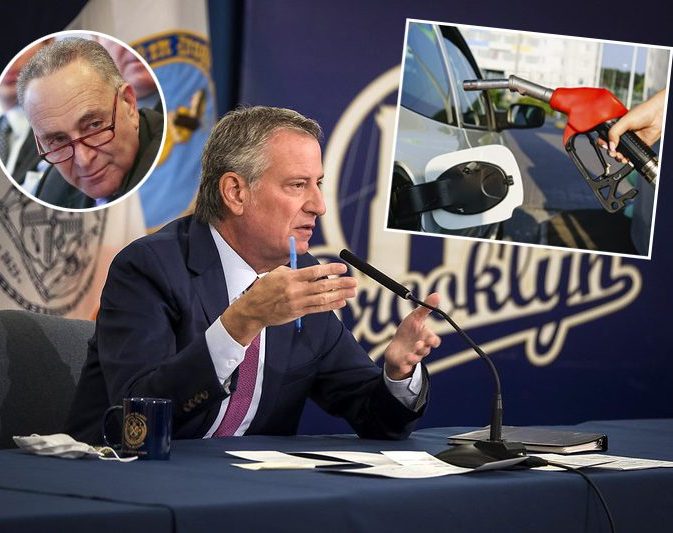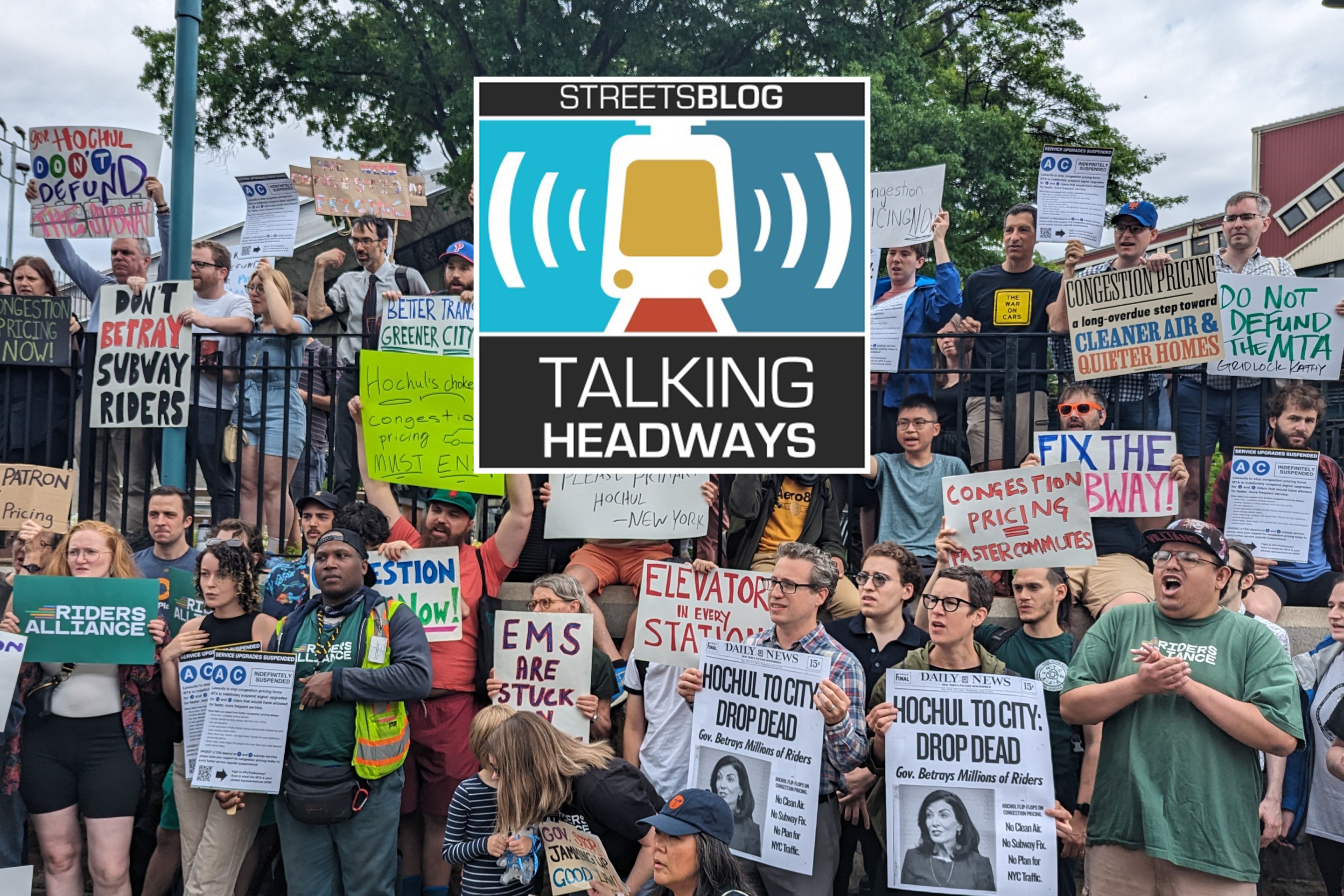The other day, New York's senior Sen. Chuck Schumer — in a not-nearly-rare-enough bow to car drivers — called on President Biden to take federal action to reduce the price of gasoline so that New Yorkers can continue to use petroleum at the levels and expense to which they have become accustomed.
Schumer's call to release petroleum from the nation's strategic reserve came about a week after 11 Democratic senators (mostly from states that currently have cold climates, but won't for long if current fuel-burning trends continue) sent a letter to Biden asking for the same thing.
Like those self-styled Democrats, Schumer also said that after the short-term decrease in fuel cost, America could get back to the business of reducing our dependence on fossil fuels (something we actually haven't ever done yet).
Our Streetsblog NYC colleague Gersh Kuntzman — who opposes subsidies that enabling drivers — thought all this talk of "high" fuel costs was bizarre, coming from a dozen DINOs who claim they want to fight global climate change ... as long as they don't have to change climate their homes below a balmy 78 degrees. So he asked New York City Mayor Bill de Blasio — who has long talked about the need to reduce New Yorkers' use of the automobile, has long described how excessive driving leads to increased road violence, and who has also talked about how a new congestion toll will reduce cars in Manhattan — if he would be willing to take on the senior Senator and seek to keep gas prices high to discourage driving.
Here's what he asked:
Over the weekend, the senator said that President Biden should release fuel from the strategic reserve because gas prices are very high. And he said that after this short-term reduction in fuel prices, America could then restart its effort to reduce the use of fossil fuels. But aren’t high fuel prices a key part of America’s effort to get off fossil fuels? Do you support Sen. Schumer’s call for federal efforts to reduce the price of fuel, whose cost is being driven up in part because of extremely large vehicles that Americans are choosing to buy in greater numbers and then turning around and complaining about high fuel costs?
Here was the mayor's answer:
I gave you credit you're asking a big thoughtful question, but I look at it a little differently than the way you're framing it. I'm in the camp that says we need to over time — not much time — over time, break our dependence on fossil fuels in a very radical way. But I also want to respect the fact that everyday working people in this city and in this country are hurting right now. They're hurting from all the effects of COVID, they're hurting from inflation. I think Sen. Schumer is right about what we need to do right now to help people through. I hear your bigger point. I really do. And in the future, we got to figure out the right way to help get people away from fossil fuels. But I don't, wouldn't put that in the context of this immediate question, when folks are coming out of COVID and dealing with the challenge of inflation simultaneously.
It was a funny answer from a mayor who only last month he said that climate change "poses an existential threat to New York City, and we must do everything in our power to confront this crisis head on." (Hours later, in a bit of poor optics, de Blasio flew to Washington, D.C. to be on hand as "Amtrak" Biden signed the $1.2-trillion infrastructure bill.)
Concern over "high" fuel prices in New York City is a symbol of our larger national ennui over actually reducing our collective carbon footprint because if discouraging driving can't be done in the Big Apple — where only 22 percent of workers commute to their jobs in their own car and 73.3 percent take transit, walk or bike — it can't be done anywhere.
And it certainly won't be done in a nation that has been on an SUV-buying spree for years now — and now that particular chicken has come home to roost. (Worth noting that Schumer's bid to reduce fuel costs would mostly help Republicans who don't seem to care about the ramifications of their wastefulness; according to the market analysis firm, Strategic Vision, consumers who self-identify as Republican buy eight pickup trucks for every one purchased by a self-identified Democrat. They also buy roughly twice as many SUVs as their blue counterparts, giving them a 55-percent share of the sport utility market overall, though just 25 percent of Americans identify as members of the GOP.)
Streetsblog NYC was not alone in thinking that Mayor de Blasio and Chuck Schumer have been sniffing too many gas fumes lately. After hearing these comments, the outlet reached out to responsible people and discovered that the electeds are wrong to advocate for lower gas prices:
"You are 100 percent right," said Beth Osborne of the progressive group, Transportation for America. "Higher fuel prices should be the actual reason for a major push to address reliance on gas. Why would this high cost burden be a reason to pause forcing people to just deal with it? We should help people get off this roller coaster as soon as possible."
And Noa Banayan, the director of Federal Affairs for People for Bikes, added that the high cost of fuel should encourage federal officials (paging you, Sen. Schumer) to incentivize the purchase of vehicles that neither waste fuel nor congest the roads.
"To fight the climate crisis and enhance mobility, the federal government must invest in low-cost, emissionless active transportation infrastructure and incentives for all Americans," she said. "The Build Back Better Act includes billions in funding for climate and equity focused infrastructure, a tax credit for e-bikes and commuter benefits for biking to work. If Sen. Schumer's goal is to keep Americans moving and support low personal mobility costs, then we urge him and his colleagues to send the package to the president's desk before the end of the year."
Julie Tighe, president of the New York League of Conservation Voters, added, "There's no question that fossil fuels are bad for the environment and extremely economically volatile. We need to prioritize clean fuels and electric options for cars and trucks, as well as reliable and convenient mass transit and micro mobility alternatives. These are not just environmental issues, but kitchen-table issues as well."
We'll see where this all goes. The NY Times reported that the administration is considering releasing fuel from the reserve, which will drop prices in the short term. The White House is also considering asking OPEC national to increase supply, which tends to lower prices, which tends to increase consumption, which tends to warm the planet and tends to flood New York City.






